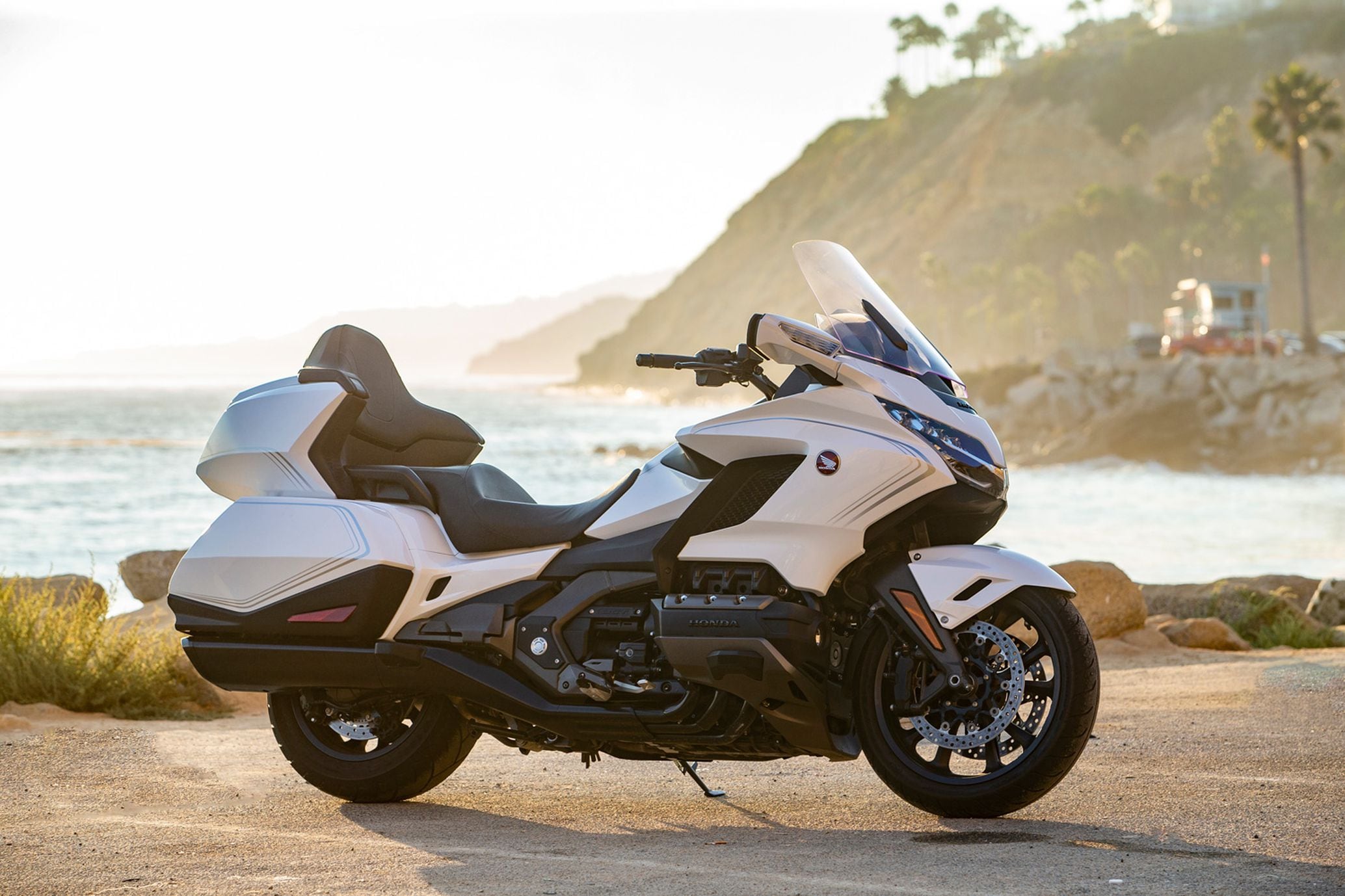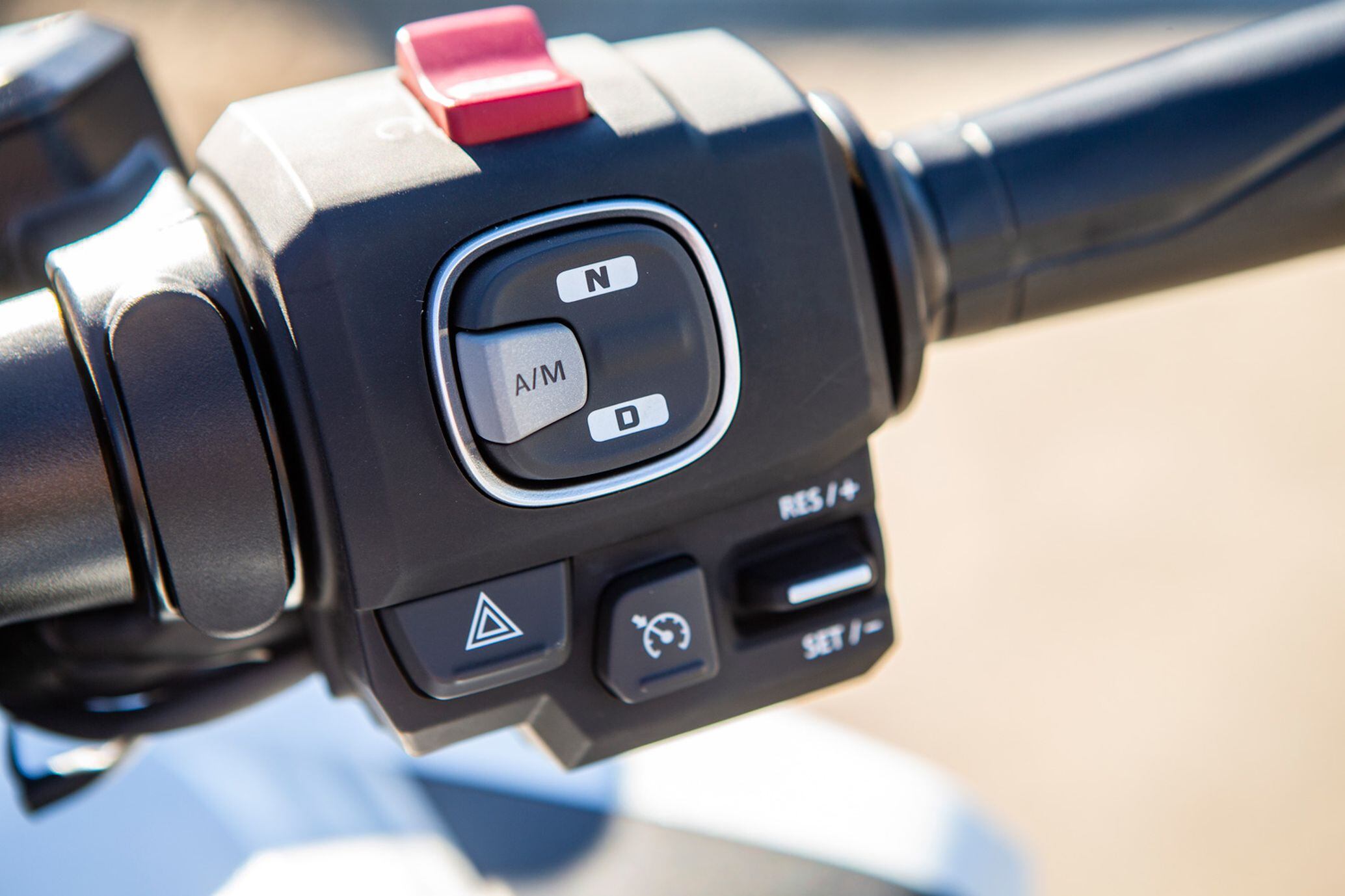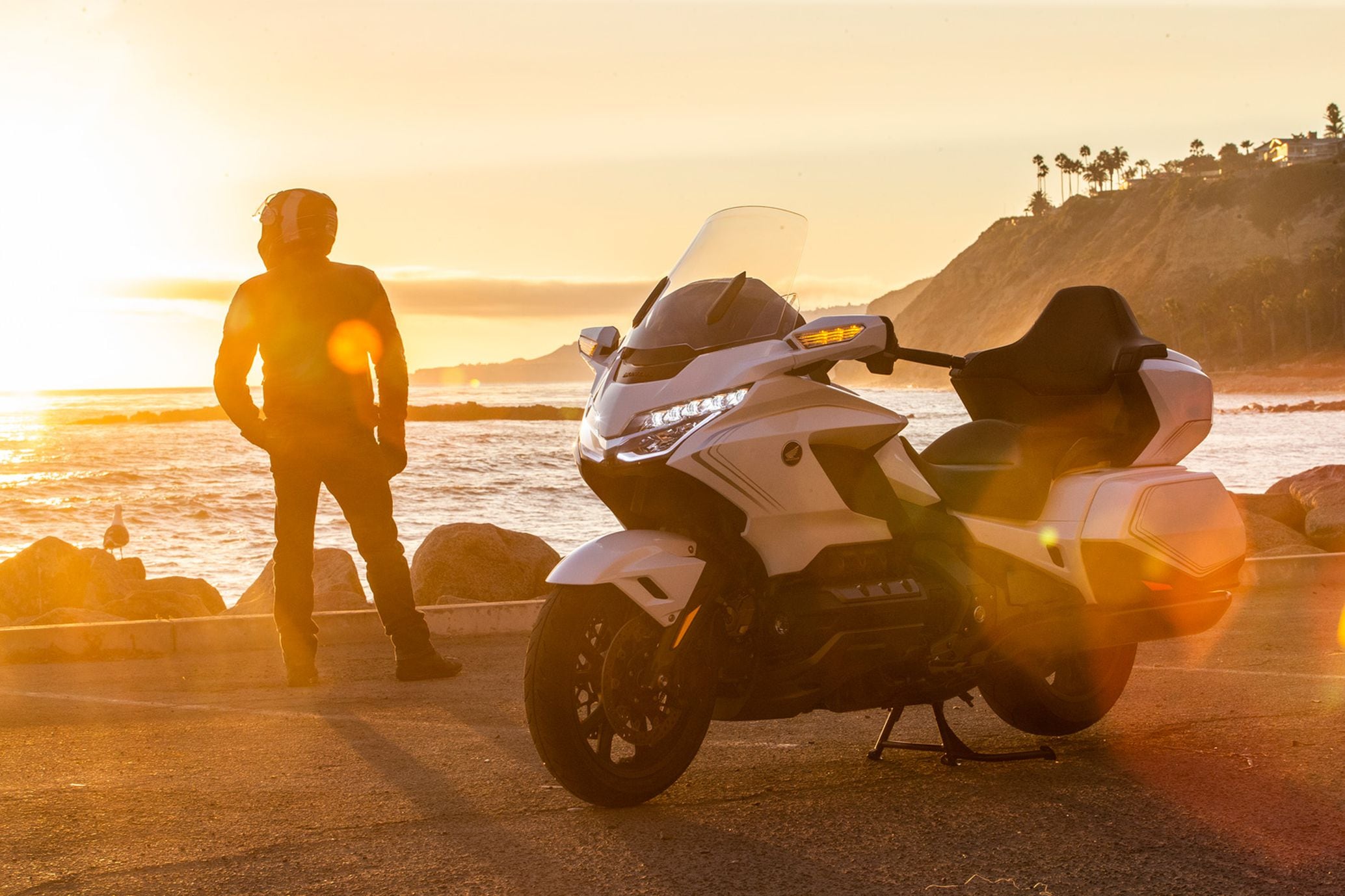2020 Honda Gold Wing Tour DCT Test Review
Seventh gear and other exquisite states of being.

There are a lot of elements of the 2020 Honda Gold Wing Tour DCT that can define it but it is perhaps the 103 pound-feet of torque that does it best.
And it’s not just that there is 103 pound-feet. No, it’s that this torque peak happens at about 1,400 rpm. And, in fact, torque is more than 100 pound-feet from 1,000 rpm to 3,500, and gently tapers off as it approaches its 6,400 rpm rev-limiter.
ADVERTISINGAds by TeadsPut it this way: At idle rpm, the Gold Wing makes more torque than most production motorcycles on the market. Add to this the horsepower that builds in a nearly perfect straight line as rpm rises. See the dyno video and test report here.
Related Content: How Much Power Does A 2020 Honda Gold Wing Tour DCT Make?
ADVERTISEMENT
This is a kind of internal-combustion effortlessness that informs every movement of the Gold Wing, particularly because the horizontally opposed six-cylinder is so smooth. Even at 845 pounds with its 5.6-gallon fuel tank full, as measured on the CW scale, the Gold Wing is fingertip easy to control when in motion. The reverse and forward “walking control” mode means also that even fully loaded and two up, the rider can use the "+" and "-" Dual Clutch Transmission manual-shift buttons to maneuver the bike with confidence and ease.
And paddling around parking lots is fine, but it’s not where the Wing shines. If you said I had to ride three consecutive 1,000-mile days on the Gold Wing, I’d say, “When do I get to start?!”

Hopefully, you’d say, “As soon as you click the seven-speed DCT automatic transmission into drive.” For those with a religious affiliation to manual clutches and toeing a shift lever, shift on, my friends. I mean, I love having great clutch control and using my brain to perfectly rev-match downshifts. I enjoy riding two up with my wife or son and deftly modulating clutch and throttle for the smoothest possible departure and seamless shifts so we never knock helmets or experience any other untoward lurching.
ADVERTISEMENTBut I can’t tell you how much I enjoy letting DCT do all of that for me through excellent mapping in any of its riding modes. There is Sport, which is Honda showing off how edgy it can be, and Econ, which is so stubbornly frugal it shifts into seventh gear at about 41 mph. Rain does the obvious, and Tour was the mode of choice here about 96 percent of the time because it matched almost every riding condition with appropriate and expected shift points with just-right ride-by-wire throttle response.

DCT is a remarkably great motorcycle automatic transmission system. The mapping is exceptionally thorough and takes into account many elements as it decides when to shift and how to control the engagement of its two clutches (one for odd gears and one for even). You can, for example, blip the throttle at a stop and the bike won’t lurch forward. It senses the speed of wrist movement and rapid throttle closure and never gets past just kissing the plates together, then backs off. But just whap it with a handful from a stop and you rip away from the line, the same way every time. I think it is in the motojournalist handbook that all are supposed to say, “Oh, ho ho, I reached for the clutch and grabbed air a bunch of times…,” which once was true for me, I think. My recent 1,400-mile stint on this DCT was interrupted by a motorcycle with a clutch, and I tell you, no lie, I rolled the throttle on in neutral when a light turned green, fully expecting the bike to move. Is that irony?
I did occasionally use the manual-shift buttons to downshift for corners (it will override auto modes as well as allow full manual selection), but letting the transmission do its thing in Tour was all I wanted. If I was riding smoothly and swiftly but not braking exceptionally hard, it might downshift entering a corner at say, 3,000 rpm. But if I started charging hard and using significant braking force, it would alter that rpm to more like 4,500, and it would hold higher revs through the corner and down the next straight. Mellow yourself for a minute and pretty soon you were cruising in 1,500-2,000 rpm range again.
ADVERTISEMENT
The only weakness of DCT is that it doesn’t know what you’re going to do. So while it is very good at low speeds, the very fine clutch/brake/throttle coordination and predictive response you might use when doing a full-steering-lock, feet-up U-turn just isn’t there. Of course, in this line of business, a typical photo shoot makes for probably 200 feet-up U-turns on back roads, which must be executed quickly, so this stands out more for us than it may for a typical user. Also, as I have learned how DCT responds and refined my throttle control, it’s pretty good in these exceptional situations. Plus: It does seem somewhat odd that a bike with automatic clutch control also has a hill holding brake function.
Sign up here to receive our newsletters. Get the latest in motorcycle reviews, tests, and industry news, subscribe here for our YouTube channel.
Why seven speeds? DCT’s first through fourth gears cover the same ratio spread as the manual’s first through third because it narrows the gaps between shifts and therefore reduces shift-shock. Seventh gear is the same ratio as the manual sixth, and the shaft final drive ratio is the same.
ADVERTISEMENT
Now, we’ve spent a lot of time talking about DCT but in practice the system is all but invisible. Also, Gold Wing buyers prefer it, as two-thirds of them choose DCT. If I were buying this bike, I would too.
Exploring the operation of DCT on a back road is superb because the chassis and brakes are fully game for all the speed you want. Cornering clearance is solid for a full-dress tourer and we managed to drag the tip-over-bar covers and exhaust header covers in highly spirited riding. Steering is light and neutral at all speeds, and, as is Honda’s excellent habit in development on most streetbikes, braking while leaned over doesn’t affect steering. That is, you can change braking input while entering a turn and neither your steering input at the bar nor your chosen cornering line changes. This is very good engineering, no doubt aided by the double-wishbone front suspension (with new damping rates for 2020). The design has tuned-in braking dive (riders use dive as a guide to how hard they are braking and like to have some), and remains responsive to bumps better than telescopic forks, which tend to bind during hard braking.

We asked specifically what the 2020-model-year changes were to front and rear damping but were told only that the front bump stop was altered and that damping was changed for “comfortability,” a darling, wonderful word used by, presumably, the Japanese engineer who answered our written questions. Suffice it here to say that damping on this bike is both controlled and comfortable, and spring preload on the four user-selected settings were well suited to our use.

The Gold Wing’s 126.6-foot stopping distance from 60 mph is among the best of any bike we have tested. Overall braking performance of the combined ABS is some of the most sure-feeling and confidence-inspiring we have tried. Front and rear brakes are always blended in their operation, no matter if you use only the “front” lever or “rear” pedal. It changes the blend based on your riding and vehicle speed. That automatic bias change never makes itself apparent; you just get very secure, excellent braking performance all the time.

And that engine. Very smooth, very happy to effortlessly motor along at 1,500 rpm, it gets pretty animal when you let the revs rise. Overall recorded fuel economy during testing was 40.8 mpg. With the fuel tank’s 5.6-gallon capacity leads to a 229-mile range to empty.
Add in superb cruise control, keyless ignition and bag-unlocking, the electrically adjustable windscreen, auto-canceling turn signals (which can be made manual in the menu) and it is a very easygoing motorcycle to live with for commuting or touring on a day-to-day basis. The bothersome things include that this is not a touchscreen nav/infotainment system. The overall menu navigation is not particularly intuitive or easy to use, and CarPlay requires quite a bit of left-grip button pushing to even change artists when listening to music while riding. We won’t get bogged down in the details, and the system is usable, but a reduction in clunkiness would be a benefit. A 2020 update to software (available for 2018 and newer bikes) has added Android Auto functionality.

As Honda shrunk and lightened the Gold Wing for its last redesign in 2018, baggage capacity was reduced, and it’s been the subject of much debate. As we have said before, we like the more “human” size of this version and are OK with a small capacity trade-off.
There were no ergonomic complaints from testers. We measured a 29.4-inch seat height with the electronic spring preload adjustment set to Rider, Empty Bags. The rider and passenger seat are exceptionally comfortable and wind/heat management from the protective fairing and electrically adjustable windscreen (I am 6-foot-2) are superb.
Pearl Glare White with nice stripes doesn’t hold a candle to the 2018′s Pearl Stallion Brown, as far as the name goes. Nonetheless, paint finish is quite nice, and the blacked-out engine, exhaust system, and wheels are a nice contrast. Styling is pure, crisp-if-conservative Honda. It looks absolutely Gold Wing, as it did when it debuted in 2018. It’s not as hip as a Husqvarna, but if Husky built this bike in this color it’d have to call it the Vitkylskåp, which translates to “white refrigerator.” Sorry, maybe I forced that one a bit…

None of the five Gold Wing models is inexpensive (they start at $23,800), and this one costs $28,500 with its selection of options, but it is competitive in its class and represents good value in that context. As far as competition goes, the BMW K1600 models generally have a lot more sizzle from an engine with something like 30 more horsepower (our 2012 long-term testbike dyno run can be found here) and also carries its weight a bit higher. Classic V-twin full-dressers from Harley-Davidson and Indian generally feel a bit heavier, don’t have the same overall performance, and don’t offer reverse. The new, liquid-cooled Indian Challenger, however, does offer similar engine output as the Gold Wing, though no top trunk for 2020. A comparison test of the expected top-trunk-equipped 2021 Challenger and Gold Wing is in order.
Related Content: 2018 Honda Gold Wing Tour vs. BMW K1600B Grand America

We wrangled a 2020 Gold Wing partly because we are deep in the throes of Ten Best Bikes voting, and it’s impossible to leave this bike out of the mix. The Wing has been on the list a record 21 times since 1976, and essentially invented the technical luxury tourer. Honda continues to march it ever closer to perfection, at least as the times, riding culture, and customer needs define it. This particular model is defined by effortlessness and ease of use, and backed up with broad utility and excellent performance.

2020 Honda Gold Wing Specifications
| MSRP: | $28,500 |
| Engine: | 1,833cc, SOHC, liquid-cooled, horizontally opposed six-cylinder; 4 valves/cyl. |
| Bore x Stroke: | 73.0 x 73.0mm |
| Transmission/Final Drive: | 7-speed automatic DCT/shaft |
| Cycle World Measured Horsepower: | 90.0 hp @ 5,420 rpm |
| Cycle World Measured Torque: | 102.5 lb.-ft. @ 1,370 rpm |
| Fuel System: | Fuel injection |
| Engine Management/Ignition: | Full transistorized |
| Frame: | Aluminum twin-spar |
| Front Suspension: | Double wishbone type; 4.3-in. travel |
| Rear Suspension: | Pro Arm single-sided swingarm w/ Pro Link single shock plus 4 electronically adjustable preload settings; 4.1-in. travel |
| Front Brake: | Hydraulic; dual 320mm discs |
| Rear Brake: | Hydraulic; single 316mm disc |
| Wheels, Front/Rear: | N/A |
| Tires, Front/Rear: | 130/70-18 / 200/55-16 |
| Rake/Trail: | 30.5º/4.3 in. |
| Wheelbase: | 66.7 in. |
| Ground Clearance: | 5.1 in. |
| Cycle World Measured Seat Height: | 29.4 in. |
| Fuel Capacity: | 5.6 gal. |
| Cycle World Measured Wet Weight: | 845 lb. |
| Availability: | Now |
| Contact: | powersports.honda.com |
CW Measured Performance
| Horsepower | 90.0 hp @ 5,420 rpm |
| Torque | 102.5 lb.-ft. @ 1,370 rpm |
| Quarter-Mile | 12.91 sec. @ 104.89 mph |
| 0–30 | 1.80 sec. |
| 0–60 | 4.17 sec. |
| 0–100 | 11.29 sec. |
| Top-Gear Roll-On, 40–60 mph | 6.15 sec. |
| Top-Gear Roll-On, 60–80 mph | 7.90 sec. |
| Braking, 30–0 | 35.21 ft. |
| Braking, 60–0 | 126.63 ft. |

